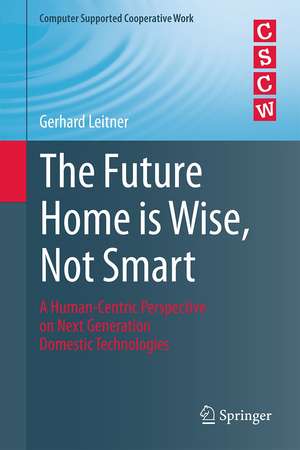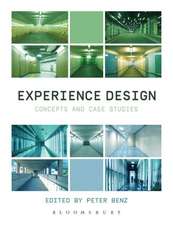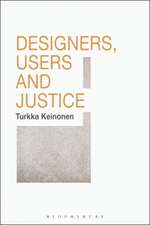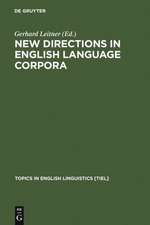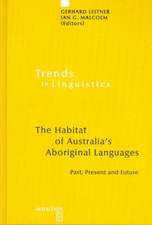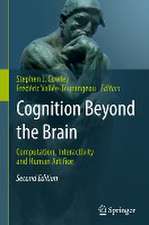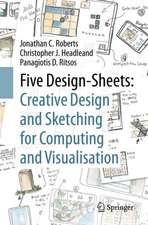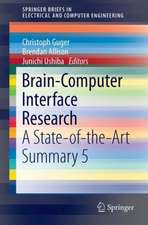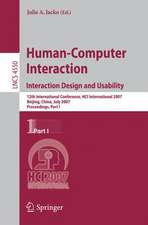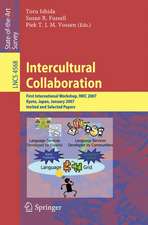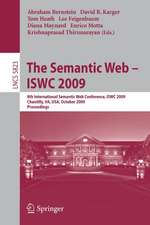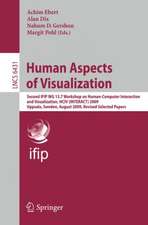The Future Home is Wise, Not Smart: A Human-Centric Perspective on Next Generation Domestic Technologies: Computer Supported Cooperative Work
Autor Gerhard Leitneren Limba Engleză Hardback – 12 oct 2015
The theoretical basis of the wise home is explored and examples for its application for future living are presented based on empirical studies and field work carried out by the author. Principles of HCI and the meaning of the home from differing scientific perspective are discussed and a research model (based on the concept of user experience (UX)) and iterations is introduced. This has resulted in field deployment guides being produced through a systematic development process.
The Future Home is Wise, not Smart will be essential reading to home system developers, designers and researchers, responsible for smart home deployment or Ambient Assisted Living (AAL) who will get insights on how to follow a novel approach in developing and adapting smart home systems to their users’ needs. Students with an interest in software design for pervasive systems will benefit by receiving information on how to develop and customise systems for the specific needs of living environments.
| Toate formatele și edițiile | Preț | Express |
|---|---|---|
| Paperback (1) | 324.82 lei 6-8 săpt. | |
| Springer International Publishing – 23 aug 2016 | 324.82 lei 6-8 săpt. | |
| Hardback (1) | 330.90 lei 6-8 săpt. | |
| Springer International Publishing – 12 oct 2015 | 330.90 lei 6-8 săpt. |
Din seria Computer Supported Cooperative Work
- 20%
 Preț: 1044.25 lei
Preț: 1044.25 lei - 20%
 Preț: 650.59 lei
Preț: 650.59 lei - 20%
 Preț: 647.61 lei
Preț: 647.61 lei - 20%
 Preț: 638.55 lei
Preț: 638.55 lei - 20%
 Preț: 334.53 lei
Preț: 334.53 lei - 20%
 Preț: 328.79 lei
Preț: 328.79 lei - 20%
 Preț: 334.71 lei
Preț: 334.71 lei - 20%
 Preț: 328.79 lei
Preț: 328.79 lei - 20%
 Preț: 649.28 lei
Preț: 649.28 lei - 20%
 Preț: 643.50 lei
Preț: 643.50 lei - 20%
 Preț: 329.91 lei
Preț: 329.91 lei - 15%
 Preț: 642.83 lei
Preț: 642.83 lei - 20%
 Preț: 648.11 lei
Preț: 648.11 lei - 20%
 Preț: 996.40 lei
Preț: 996.40 lei - 20%
 Preț: 647.79 lei
Preț: 647.79 lei - 20%
 Preț: 413.81 lei
Preț: 413.81 lei - 20%
 Preț: 336.02 lei
Preț: 336.02 lei - 20%
 Preț: 346.10 lei
Preț: 346.10 lei - 20%
 Preț: 330.24 lei
Preț: 330.24 lei - 20%
 Preț: 982.36 lei
Preț: 982.36 lei - 20%
 Preț: 329.11 lei
Preț: 329.11 lei - 20%
 Preț: 987.32 lei
Preț: 987.32 lei - 20%
 Preț: 641.34 lei
Preț: 641.34 lei - 20%
 Preț: 648.26 lei
Preț: 648.26 lei - 20%
 Preț: 995.89 lei
Preț: 995.89 lei - 20%
 Preț: 643.63 lei
Preț: 643.63 lei - 20%
 Preț: 988.98 lei
Preț: 988.98 lei - 20%
 Preț: 328.42 lei
Preț: 328.42 lei - 20%
 Preț: 988.81 lei
Preț: 988.81 lei - 20%
 Preț: 643.30 lei
Preț: 643.30 lei - 20%
 Preț: 987.17 lei
Preț: 987.17 lei - 20%
 Preț: 329.58 lei
Preț: 329.58 lei - 20%
 Preț: 309.58 lei
Preț: 309.58 lei - 20%
 Preț: 330.42 lei
Preț: 330.42 lei - 5%
 Preț: 365.82 lei
Preț: 365.82 lei - 20%
 Preț: 650.08 lei
Preț: 650.08 lei - 20%
 Preț: 334.38 lei
Preț: 334.38 lei - 20%
 Preț: 645.79 lei
Preț: 645.79 lei - 20%
 Preț: 650.40 lei
Preț: 650.40 lei - 20%
 Preț: 333.88 lei
Preț: 333.88 lei - 20%
 Preț: 1263.81 lei
Preț: 1263.81 lei - 20%
 Preț: 830.58 lei
Preț: 830.58 lei - 20%
 Preț: 704.70 lei
Preț: 704.70 lei
Preț: 330.90 lei
Preț vechi: 413.62 lei
-20% Nou
Puncte Express: 496
Preț estimativ în valută:
63.33€ • 65.87$ • 52.28£
63.33€ • 65.87$ • 52.28£
Carte tipărită la comandă
Livrare economică 15-29 aprilie
Preluare comenzi: 021 569.72.76
Specificații
ISBN-13: 9783319230924
ISBN-10: 3319230921
Pagini: 128
Ilustrații: XII, 128 p.
Dimensiuni: 155 x 235 x 15 mm
Greutate: 0.38 kg
Ediția:1st ed. 2015
Editura: Springer International Publishing
Colecția Springer
Seria Computer Supported Cooperative Work
Locul publicării:Cham, Switzerland
ISBN-10: 3319230921
Pagini: 128
Ilustrații: XII, 128 p.
Dimensiuni: 155 x 235 x 15 mm
Greutate: 0.38 kg
Ediția:1st ed. 2015
Editura: Springer International Publishing
Colecția Springer
Seria Computer Supported Cooperative Work
Locul publicării:Cham, Switzerland
Public țintă
ResearchCuprins
Preface.- Part I: The Current State in Smartness.- Wise – The Difference Between Smart and Smart-Ass.- Why is it Called Human-Computer Interaction but focuses on Computing Instead.- The Different Meanings of Home.- Part II: The Wise Approach: Fromm Sweet, through to Smart and WISE.- A Focused Survey on Technology from Hypocaust to Smart Appliances.- The Theoretical Foundations of the Wise Home.- Empirical Foundations of WISE.- Part III: The WISE Home of the Future.- The Proof of the WISE Concept.- The WISE Future of Home Technology.- Epilogue.
Textul de pe ultima copertă
This book introduces the concept of the wise home. Whilst smart homes focus on automation technologies, forcing users to deal with complex and incomprehensible control and programming procedures, the wise home is different. By going beyond intelligence (or smartness) the wise home puts technology in the background and supports explicit (enhanced user-experience) as well as implicit (artificial intelligence) interaction adequate to the end-user’s needs.
The theoretical basis of the wise home is explored and examples for its application for future living are presented based on empirical studies and field work carried out by the author. Principles of HCI and the meaning of the home from differing scientific perspective are discussed and a research model (based on the concept of user experience (UX)) and iterations is introduced. This has resulted in field deployment guides being produced through a systematic development process.
The Future Home is Wise, not Smartwill be essential reading to home system developers, designers and researchers, responsible for smart home deployment or Ambient Assisted Living (AAL) who will get insights on how to follow a novel approach in developing and adapting smart home systems to their users’ needs. Students with an interest in software design for pervasive systems will benefit by receiving information on how to develop and customise systems for the specific needs of living environments.
The theoretical basis of the wise home is explored and examples for its application for future living are presented based on empirical studies and field work carried out by the author. Principles of HCI and the meaning of the home from differing scientific perspective are discussed and a research model (based on the concept of user experience (UX)) and iterations is introduced. This has resulted in field deployment guides being produced through a systematic development process.
The Future Home is Wise, not Smartwill be essential reading to home system developers, designers and researchers, responsible for smart home deployment or Ambient Assisted Living (AAL) who will get insights on how to follow a novel approach in developing and adapting smart home systems to their users’ needs. Students with an interest in software design for pervasive systems will benefit by receiving information on how to develop and customise systems for the specific needs of living environments.
Caracteristici
Introduces a new paradigm – the ‘wise’ home, which shall supersede the ‘smart’ home Provides options for following more human-centric design processes Explores the challenges that techno-centrism poses for smart home technology
